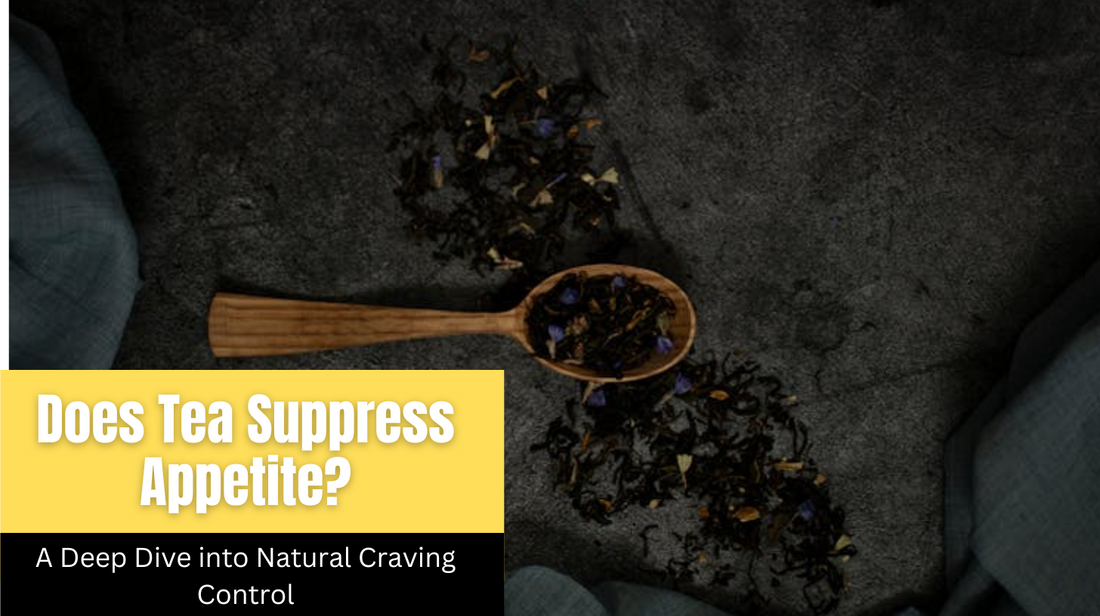
Natural Craving Control: The Power of Tea
Yes, certain types of tea can naturally suppress appetite. Herbal and traditional teas like green tea, oolong, peppermint, and yerba mate contain compounds that promote satiety, reduce cravings, and support balanced blood sugar levels—helping you feel full for longer.
Appetite control is a key factor in healthy weight management. While exercise and mindful eating are essential, what we drink can also significantly influence how hungry we feel. Many people are turning to tea as a natural way to curb appetite, avoid snacking, and create more balanced eating habits.
In this guide, we’ll uncover the mechanisms that make some teas effective for appetite suppression, highlight the best options available, and explain how to incorporate them into your lifestyle safely and effectively.
How Does Tea Suppress Appetite?
Teas suppress appetite through a variety of biological mechanisms:
1. Caffeine and Catechins (Green & Oolong Tea)
Compounds like caffeine and EGCG (epigallocatechin gallate) stimulate thermogenesis and energy expenditure while reducing hunger hormones like ghrelin.
- Green tea and oolong both contain these compounds in moderate amounts.
- 11° Mt. Pumori Best Green Tea (Certified Organic) is rich in catechins that help regulate appetite naturally.
A study published in Appetite Journal found that catechin-rich green tea significantly reduced food intake and increased satiety in participants. (source)
2. Amino Acids like L-theanine (Oolong Tea)
L-theanine promotes relaxation and stress relief, which indirectly helps reduce emotional eating and the urge to snack.
-
Himalayas Best Oolong Tea provides L-theanine and moderate caffeine for appetite balance and calm energy.
3. Volatile Oils (Peppermint & Herbal Teas)
Peppermint tea contains menthol, which can help reduce hunger signals and support digestion.
-
While Danfe doesn’t currently offer peppermint, similar benefits can be found in calming, gut-supportive teas like:
- 47° Tulsi Chamomile Tranquility Herbal Tea
- 05° Tulsi Tea (Sacred Basil Tea)
These blends reduce stress and balance hormones like cortisol, which play a major role in cravings.
4. Digestive Support (Lemongrass & Herbal Detox Teas)
When digestion is optimized, your body sends clearer signals about hunger and fullness. Herbal teas can:
- Reduce bloating
- Improve nutrient absorption
- Regulate blood sugar, reducing sudden hunger spikes
Try: 62° Lemongrass Tea (Loose Leaf Herbal Tea) to calm the digestive tract and gently assist in appetite control.
Best Teas That Suppress Appetite
- Green Tea – High in catechins, supports fat burning and satiety
- Oolong Tea – Balances energy and hunger with theaflavins and L-theanine
- Tulsi Tea – Adaptogen that controls stress-related cravings
- Lemongrass Tea – Refreshing and soothing for digestion and appetite
- Chamomile Blends – Ideal for evening relaxation and emotional eating prevention
How to Use Tea for Appetite Control
- Drink 1 cup 20–30 minutes before meals to help reduce overeating
- Sip between meals to stay hydrated and avoid snacking
- Avoid adding sugar—opt for lemon, mint, or cinnamon
- Stay consistent: regular use helps stabilize hunger patterns
Related Reads:
- Best Slimming Tea: A Complete Guide to Natural Weight Loss
- Green or Oolong: Best Loose Leaf Weight Loss Tea
FAQs
1. Does tea really suppress appetite?
Yes, especially teas with caffeine, catechins, and adaptogens like green tea, oolong, and tulsi.
2. Which tea is best for curbing hunger?
Green tea and oolong are most effective due to their metabolism and hormone-balancing effects.
3. Can herbal teas reduce cravings?
Yes, calming teas like tulsi and chamomile reduce stress-induced snacking and improve digestion.
4. How many cups should I drink to reduce appetite?
1–3 cups per day—spaced between meals—can help reduce hunger naturally.
5. Does tea help with emotional eating?
Certain teas reduce cortisol, which can lessen the emotional triggers behind mindless snacking.










